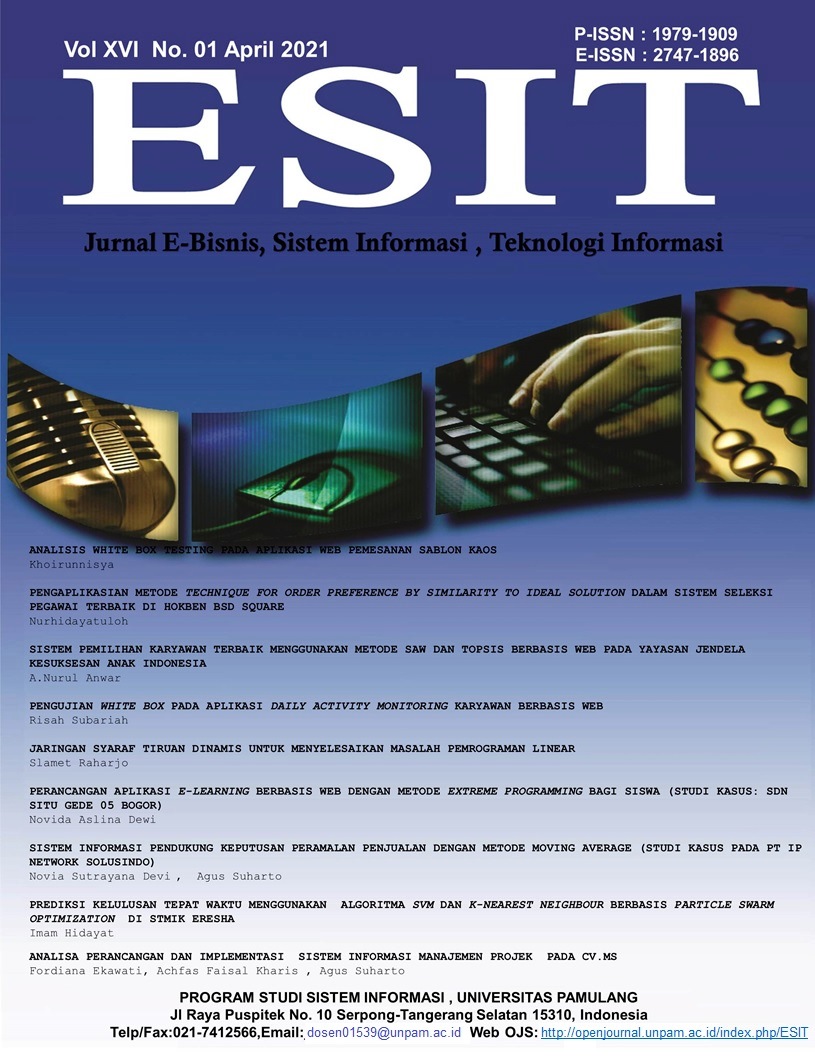PREDIKSI KELULUSAN TEPAT WAKTU MENGGUNAKAN ALGORITMA SVM DAN K-NEAREST NEIGHBOUR BERBASIS PARTICLE SWARM OPTIMIZATION DI STMIK ERESHA
Abstract
ABSTRAK
PREDIKSI KELULUSAN TEPAT WAKTU MENGGUNAKAN ALGORITMA SVM DAN K-NEAREST NEIGHBOUR BERBASIS PARTICLE SWARM OPTIMIZATION DI STMIK ERESHA. Kelulusan mahasiswa bagi suatu perguruan tinggi menjadi elemen penting untuk penilaian akreditasi. Kelulusan tepat waktu untuk pencapaian gelar magister membutuhkan waktu normal selama 2 tahun atau 4 semester, namun pada kenyataannya banyak mahasiswa yang lulus tidak tepat waktu. Banyak faktor yang menyebabkan ketidaktepatan waktu kelulusan antara lain bersumber dari faktor internal dan faktor external. Pada penelitian ini telah diterapkan metode klasifikasi dengan algortima Support Vector Machine dan K-Nearest Neighbour berbasis Particle Swarm Optimization untuk mencari metode yang terbaik dalam mengkalisifikasi data mahasiswa di STMIK Eresha. Terkait atribut yang digunakan adalah IPS (Indek Prestasi Sementara), SKS (Satuan Kredit Semester) lulus, usia, asal perguruan tinggi, status mahasiswa, status pernikahan dan status pekerjaan mahasiswa. Hasil penelitian ini menunjukan bahwa algoritma terbaik antara algoritma SVM dan K-NN yaitu algoritma K-NN dengan nilai k-7 dengan nilai akurasi 78,73%, sedangkan algortima SVM sebesar 73,41% dan setelah penambahan algortima PSO akurasi terbaik terdapat pada nilai K-9 dengan akurasi 80,21% dengan penambahan nilai akurasi sebesar 1,48 %. Hasil penelitian ini menunjukan bahwa algortima K-NN menjadi algoritma yang tepat dibandingkan dengan algortima SVM untuk memprediksi kelulusan tepat waktu di STMIK Eresha.
Kata Kunci: Kelulusan tepat waktu, Prediksi, SVM, K-NN, PSO
ABSTRACT
Student graduation for university becomes an important element for accreditation assessment. Timely graduation to achieve a master's degree requires normal time for 2 years or 4 semesters, but in reality many students do not graduate on time. Many factors that cause the inaccuracy of graduation time include internal and external factors. In this study a classification method with the Support Vector Machine and K-Nearest Neighbour s based on Particle Swarm Optimization has been applied to find the best method for classifying student data at Eresha STMIK. Related to the attributes used are GPA (Great Point Average), credit passed, age, university origin, student status, marital status and student employment status. The results of this study indicate that the best algorithm between the SVM and K-NN algorithm is the K-NN algorithm with k-7 value with an accuracy value of 78.73%, while the SVM algorithm is 73.41% and after the addition of the PSO algorithm the best accuracy is found in the value K-9 with an accuracy of 80.21% with the addition of an accuracy value of 1.48%. The results of this study indicate that the K-NN algorithm is the right algorithm compared to the SVM algorithm to predict timely graduation at STMIK Eresha.
Keywords: Timely graduation prediction, SVM, -NN, PSO


